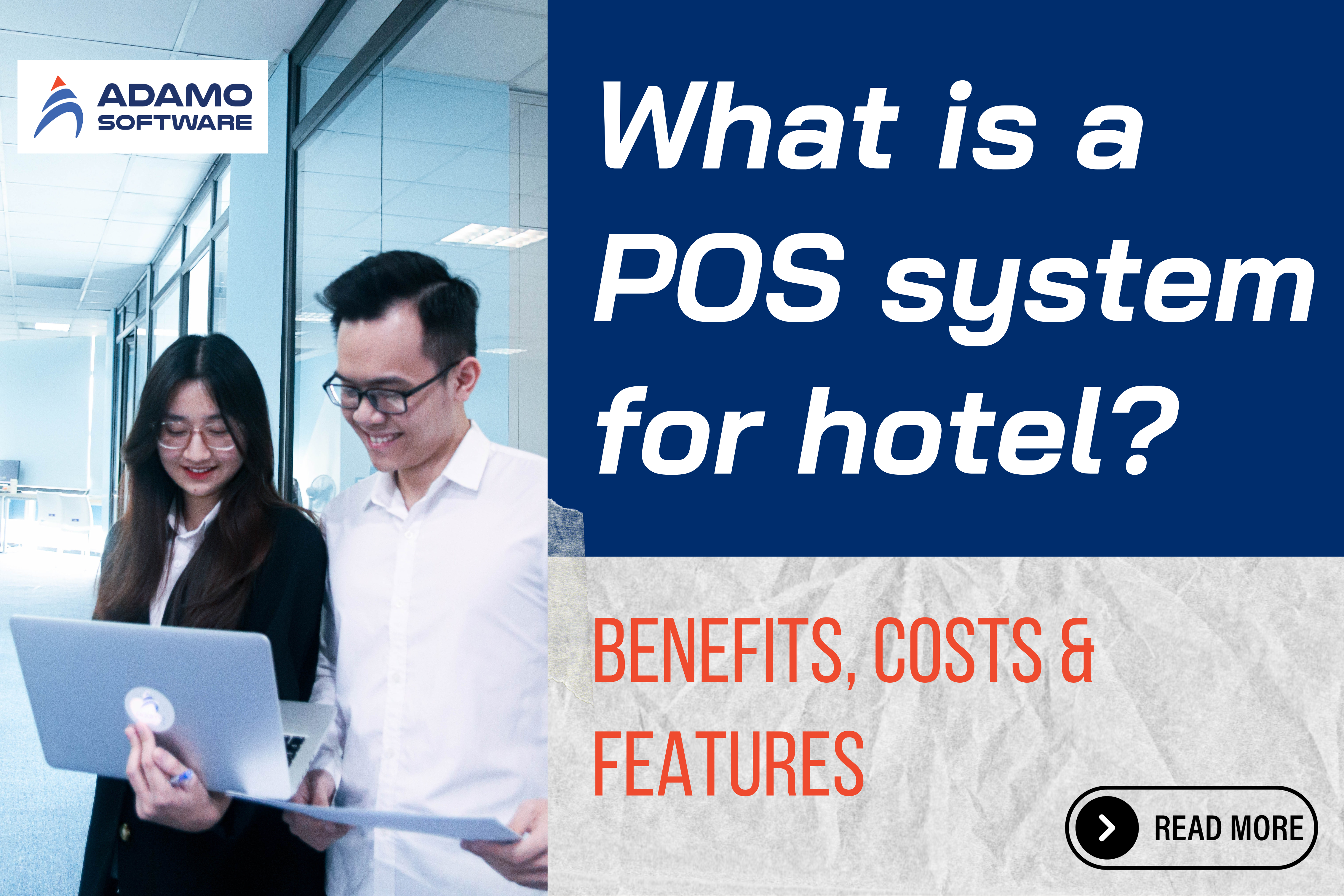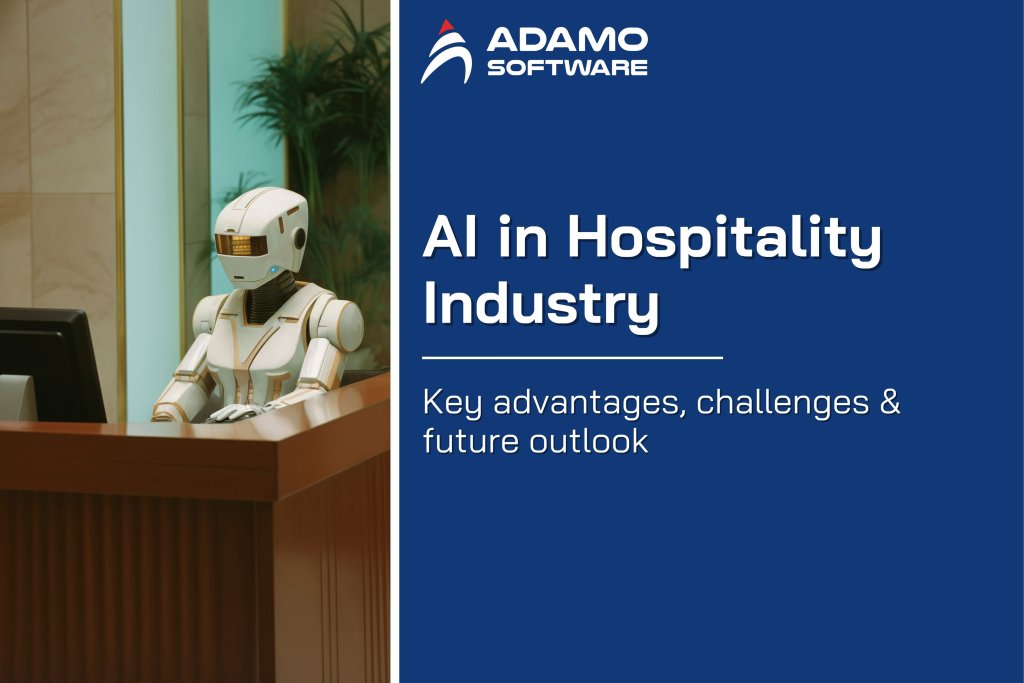What is a POS System for Hotel? Benefits, Costs, and Features

A POS system for hotel can significantly simplify daily hospitality tasks and in some cases generate revenue. Check it out.
Where do hotel revenues come from? Many hotels offer additional services, sell tours, rent meeting rooms to corporate clients, and have bars, restaurants, spas, gift stores, and other additional profit streams – or POS systems for hotels – in addition to room reservations.
Guests can make numerous purchases and other transactions on the property, and they must be all accurately processed and synchronized to facilitate a streamlined exit that results in satisfied customers. In this article, we will discuss how POS systems of hotels facilitate streamlined, more efficient hotel operations.
I. What is a POS System?
A point-of-sale (POS) system is a tool that allows your hotel to accept payments. There are 3 fundamental elements of modern POS systems for hotels:
_ Hardware: There are several distinct components of POS hardware. To accept credit cards, debit cards, and mobile wallet payments, a card terminal is required. Other equipment includes a receipt printer, a cash drawer, and a scanner for scanning bar-coded items.
_ Software: The software on your POS allows you to select items to charge from a database. Using a POS system for hotels, you can ring up sales, view customer transaction records, manage inventory, and obtain analytics and reporting.
_ Payment transfer: After each transaction, the POS transfers funds from the guest’s account to the hotel’s bank account.
There are 3 primary components of a POS system for hotels, but they can be assembled in various ways.
II. What are the benefits of a POS System?
1. Quick payments
A POS system for hotels expedites the payment process. The employee selects the products the consumer wishes to purchase, and the system calculates the price automatically. The invoice can either be emailed or printed on-site using a receipt printer.
Customers can pay by cash, credit card, or debit card, depending on the integrations and the terminal. This expedites and simplifies the customer’s ability to complete the transaction.
With a POS system for hotels, consumers have significantly less time to wait, and employees can complete transactions more quickly.
You can explore about the overview of channel management software here.
2. Better customer experience
Having a POS system for hotels can be advantageous for several reasons, but it can also enhance the shopping experience for your consumers. Creating a proper customer experience leads to better customer satisfaction, and as mentioned earlier, a fast POS system for hotels allows you to complete transactions quickly. Customers dislike waiting, so a quick POS system for hotels is also an excellent benefit for them.
You can also use your POS system for hotels to offer related products via cross-selling features. Cross-selling functions enable you to offer products that are related to the item a customer is purchasing. For instance, if a customer is purchasing a fishing rod, your employee may also offer lures. This can increase consumer satisfaction with their purchases.
Additionally, you can connect your store to an eCommerce platform. Your customers will be able to purchase and observe your products online from any location. By offering multiple channels, you can improve your customers’ purchasing experience.
3. Better inventory management
Managing a lobby shop or attempting to reduce waste in a restaurant? Instead of devoting staff time to ordering inventory, monitoring supplies, and tracking sales, your POS system for hotels can be configured to handle inventory management. Use the tool in your on-site restaurants to determine when supplies are running low and to set reminders for reordering.
Manually reconciling inventory across all retail and storage locations is time-consuming and prone to human error. Shopify explains that when your inventory syncs automatically, you always know precisely how much stock you have and where it is. Additionally, it is simple to determine how well each product is selling and to generate purchase orders based on performance and updated stock levels.
4. Track and analyze sales
Unlike a simple cash register, a POS system for hotels can provide real-time information on the financial health of a hotel. Numerous POS systems for hotels can generate daily reports on sales, consumer behavior, and even employee productivity. The same terminal that you use to process credit cards can also serve as the employee timekeeping gateway. Analyze how your sales compare to the previous month, quarter, or same time last year.
III. Recommend key features of a POS system
The following features of POS systems enable hotels to optimize their daily operations.
1. Payment processing
Customers can pay at various retail locations and through a variety of payment methods, such as cash, debit/credit cards, cheques, etc. The POS system for hotels accepts, verifies, and processes these transactions. Advanced POS tools provide multiple-payment transaction capabilities to manage bills, such as the ability to split the bill and pay via various methods, split a single item on the bill, or subtract the order of a guest who wishes to leave, etc.
2. Inventory management
The POS system for hotels can monitor inventory levels and send customized alerts when the quantity falls below a predetermined threshold. Some POS systems for hotels also enable the automated reordering of the most popular products. Integration between POS systems for hotels and third-party inventory management software ensures a continuous supply process.
3. Customer management
Collecting information about your visitors and their transaction history at your hotel can help you strengthen customer relationships, personalize the guest experience, and shape your marketing campaigns. According to the Hospitality Technology report, 60% of POS software upgrades are motivated by a desire to comprehend consumer preferences.
4. Employee management
POS systems for hotels can measure employees’ clock-in and clock-out times as well as their performance. Some platforms also provide scheduling functionality.
5. Reporting
All POS systems for hotels include basic reporting functionality and, as we already mentioned, can help monitor inventory levels, employee performance, sales activity across channels, and so on. The income from both walk-ins and hotel guests will be transmitted to your PMS, providing you with a comprehensive view of your revenue sources.
6. Integration options
Connecting your POS system for hotels to other business management systems (such as accounting and CRM) is essential for establishing a seamless information flow and data exchange.
IV. List out types of custom POS system
A POS system for hotels consists of both hardware and software. With them, you can construct various POS system configurations. These consist of:
_ Terminal or desktop POS system
_ Cloud POS system
_ Mobile POS system
_ Self-service kiosk
1. Terminal or desktop POS system
Terminal or desktop POS systems for hotels include a counter or cash register for processing transactions. They are the best option for full-service restaurants, hotels, stores, leisure salons, etc. because they typically have extensive inventory and staff management capabilities.
2. Cloud POS system
Cloud POS systems for hotels allow access from any device because they store data on an online server. Typically, such software requires a monthly subscription fee, with updates implemented automatically and at no additional cost.
3. Mobile POS system
Mobile POS systems for hotels are available as applications for mobile devices or as extensions of countertop POS systems. Typically, they come with accessories such as a credit card reader and receipt printer. In comparison to full-featured POS terminals, their functionality is limited, but they are the most affordable and in some cases even free (you only pay a charge for processing transactions). It is ideal for small enterprises that do not require additional features but require greater mobility, such as food trucks or traveling vendors.
4. Self-service kiosk
Self-service POS systems for hotels enable consumers to independently place orders and make payments. Such systems expedite the purchasing process, reduce waiting time, reduce the number of employees, and provide the now-crucial contactless experience.
V. What are the costs of building a hotel POS system?
Want to comprehend the total cost of implementing and maintaining a POS system for hotels? Numerous factors affect pricing, including the number of users, the level of customization, and the existing equipment (tablet or wireless devices used to process payments).
1. Starting costs
Numerous POS vendors offer both monthly and annual pricing, with an annual subscription typically resulting in a discount. You can anticipate paying a minimum price (depending on the number of terminals you require), one-time fees, and add-on fees if you require special features.
Implementing a POS system for hotels is typically the most expensive component. After the initial setup, you will be required to pay maintenance and transaction fees, in addition to any add-ons you selected.
2. Overall hotel POS costs
If you’re installing a system from scratch, expect to pay between $1,000 and $2,000 for each terminal and installation. After that, costs will be approximately $1000 per year per device. There may also be monthly or annual processing and supplemental fees.
VI. How does a hotel POS system integrate with PMS, CRM, payment, and more?
Today, to administer a hotel most efficiently, you need technology that supports your daily operations and growth. Here are a few examples of software systems that would necessitate integration with a POS system for hotels for optimal efficiency.
1. POS system and PMS integration
A hotel property management system (PMS) assists with administrative and management tasks and integrates all processes into a single system. The core functions of a PMS are managing reservations and processing payments, and POS system integration is required for these functions.
Throughout their visit, your guests can make purchases at a variety of retail locations, including restaurants, bars, the spa, the travel desk, the boutique, and the gift shop. Once your PMS and POS systems for hotels have been integrated via APIs, all of these ancillary charges can be added to the guest’s bill automatically, thereby preventing manual errors and discrepancies.
How specifically does it operate? When Mr. Kevin Adam orders supper in the hotel restaurant, for instance, the POS system for hotels queries the PMS to confirm his name, status, and room number. Then, by selecting “charge room” as the payment method on the POS tool, the order details are sent to the PMS to be added to the guest’s folio (taking into consideration any applicable discounts or promotions). Mr. Adam receives a total, all-inclusive room statement at check-out and can pay for everything at once. As straightforward and convenient as that!
Obviously, such an integration accelerates operations, ensures billing accuracy, and enhances alienation.
2. POS system and CRM integration
CRM software accumulates, stores, and analyzes customer information to enhance the customer experience and inform marketing decisions. Although POS systems for hotels collect customer data during payment transactions, connecting it to your CRM will help you manage your customer database, monitor customer purchasing history, develop customer loyalty programs, and gain valuable insights about your target audience. POS systems for hotels transmit sales information to the CRM and retrieve membership discounts or special offers from the CRM database to modify the bill.
So, when Mr. Adam arrives at your hotel and checks in at the front desk, the staff member enters his name and retrieves his contact information from the CRM. Since he is a frequent guest and his prior POS transactions have informed the system of his preferences, he will be notified of a promotion at the hotel golf club and a happy hour at the bar.
As a member of the loyalty program, Mr. Adam receives a 5 percent discount on his final account, which includes all POS charges, after his stay. In a couple of days, he will receive a personalized email that will ask if he enjoyed his stay and inform him about the new spa program he will certainly want to try during his next visit.
Most POS systems for hotels can be integrated with CRM software, and more advanced POS platforms include loyalty programs and feedback collection as standard CRM features.
3. POS system and payment gateway integration
Currently, contactless and digital payment methods are on the rise, displacing traditional cash transactions. You must perform a partnership with a payment processor if you wish to accept credit cards, contactless payments, and digital wallets. Each has various pricing terms and accepts various payment methods. To make the optimum choice, look for a solution that supports multiple currencies, offers the highest level of security, and supports all the payment methods you need to accept.
If you already have a booking engine on your website that allows you to accept online payments and you want to implement a new POS system for hotels, you can either integrate the new software with an existing payment gateway or use the payment gateway suggested by your POS provider (the majority of them offer built-in payment integration). Then, the PMS will receive transaction details from your online channels and POS system for hotels.
4. POS system and inventory management system integration
Inventory management is particularly crucial for retail stores and restaurants, as stockouts in these industries can result in catastrophic losses. Although hotels are not as reliant on the sale of products because the majority of their revenue comes from room reservations, they must still manage stock.
As indicated previously, modern POS systems for hotels include a variety of inventory management features that go beyond stock-level tracking, such as barcode label creation, low-stock alerts, and the ability to order replenishments directly from the POS software. Alternatively, they can be integrated with a distinct inventory management product. When a product is ordered or scanned at checkout, the inventory platform transmits product availability data to the POS system for hotels, and the POS software shares sales data each time the product is purchased, thereby updating the stock level.
So, when Mr. Adam orders a bottle of wine from the hotel bar and a tour guide from the hotel bookstore, these items are first scanned with a barcode scanner, allowing the POS system for hotels to automatically update the relevant inventory levels and inform staff if these items need to be replenished.
5. POS system and accounting/ payroll system integration
Most companies use accounting software to calculate and pay taxes, generate financial reports, pay invoices, and manage their books, cash flow, and payroll. When it comes to finances, you want maximum accuracy and immaculate data flow, so POS and accounting software integration is a must. This connectivity allows for the export of all financial and sales data from the POS system to support your back-office operations. In addition, POS systems for hotels monitor employees’ working hours, so syncing this data allows you to accurately calculate wages, taxes, and tips for payrolls.
Collecting sales and customer data also enables the creation of customized reports, the monitoring of business performance, and the analysis of key performance indicators (KPIs) to provide insight into what is occurring within the company and to facilitate further decision-making.
VII. Adamo Software – Help You Build Custom POS System For Hotel
As a premium software development company in Vietnam, Adamo Software has gained lots of experience to build custom and lucrative POS systems that ensure payment processes or CRM software that help improve customer services for hotels. It does really help many hotels. Besides, Adamo also helps create custom solutions for other parts in the travel and hospitality industry such as Property Management Software, Travel Operator Software, Travel Agent Software and more. If you are looking for a travel and hospitality software development company in Vietnam, contact us to get a free consultant and experts’ advice.





